How To Prune Leggy, Overgrown Geraniums
Have you ever walked into someone’s house and just wanted to prune their plants? Are you raising your hand on this one too? It happens to me quite often and most times I keep my mouth shut and my Felcos in their holster. I was visiting my cousin in Connecticut this past August and couldn’t resist hinting at how much space her plant was taking up in her kitchen dining area along with another one in the sunroom. She agreed wholeheartedly and into action I sprung to prune the leggy, overgrown geraniums.
Both she and I got the gene for appreciating beautiful plants and flowers but only I got the one for pruning. Amazingly, these 2 behemoth geraniums didn’t have mealybugs, aphids or spider mites. Technically these plants are both pelargoniums but most call them geraniums and they’re usually sold under that name, along with the scented geraniums and the zonal geraniums.
True geraniums have thin stems and many are cold hardy whereas whereas the pelargoniums have thicker, fleshy stems and are tender and will freeze in colder climates. The pelargoniums tend to have much showier flowers.
Some Of Our General Houseplant Guides For Your Reference:
- Guide To Watering Indoor Plants
- Beginner’s Guide To Repotting Plants
- 3 Ways To Successfully Fertilize Indoor Plants
- How to Clean Houseplants
- Winter Houseplant Care Guide
- Plant Humidity: How I Increase Humidity For Houseplants
- Buying Houseplants: 14 Tips For Indoor Gardening Newbies
- 11 Pet-Friendly Houseplants
How to prune leggy, overgrown geraniums (I should have done the pruning outdoors in better light but there were lawnmowers running on either side!):
These geraniums grow indoors as houseplants so I didn’t give them the total cut back. The same pruning technique would apply if you’re bringing yours indoors for the colder months and going to place them in sunny spots. If they’re going in your garage or cellar, then you can give them even more of a cutback.
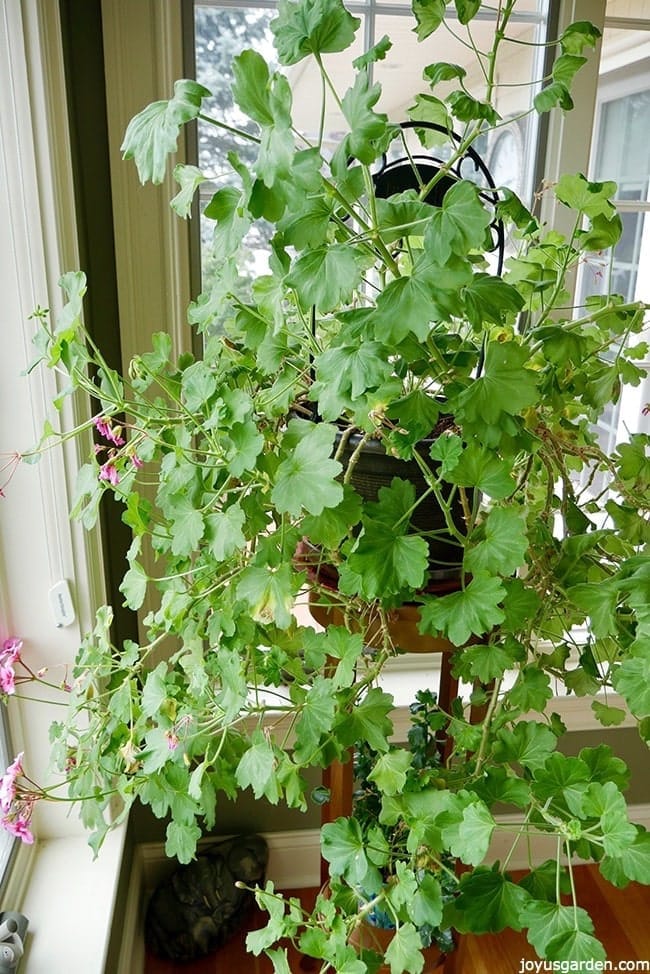
A side view of the 1st geranium I pruned. It’s not a hanging geranium but it had turned into 1!
Tip: Don’t prune in late fall or winter if you can help it. Spring & summer are the best times because plants rest in the cooler months.
It’s not difficult at all to prune an overgrown geranium but it does require some guts and a bit of patience. Here are the steps I took:
1. Break the geranium into quarters & work that way. I remove the longest, leggiest stems 1st so I can see better how the plant is growing.
Tip: Make sure your pruners are clean & sharp before you start a project like this. I always take my cuttings at an angle because I was told this lessens the chance of infection.
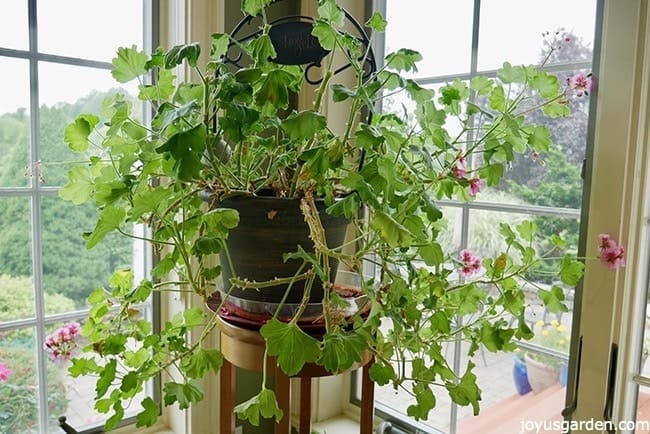
I’m over halfway done with this 1.
2. Remove the dead growth.
3. Remove any stems which cross over.
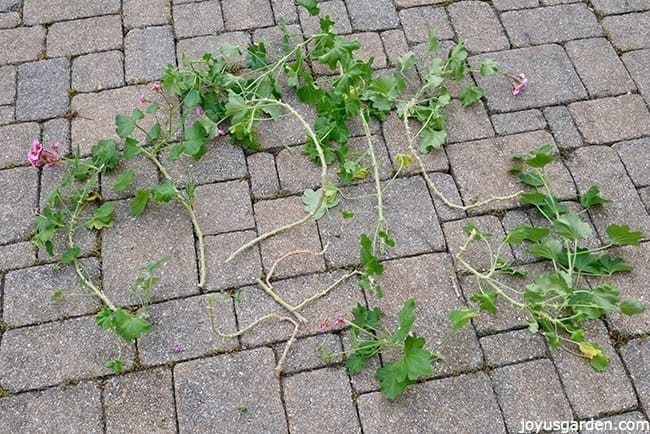
I took a sampling of stems out on the patio so you could see what I was pruning off.
4. Continue to prune stems to create the framework of how you want the plant to grow.
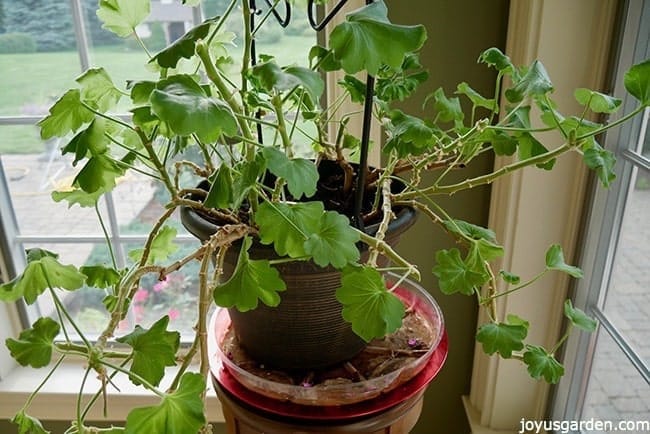
5. Remember to step back & look at the plant while you’re pruning. Remove any stems you don’t like (I always end up taking off a few more after I think I’m done!) & tip prune any which need it.
The end result of pruning geranium #1.
Both of these geraniums live indoors year round in locations with a good amount of natural light. I pruned the smaller one in exactly the same way.
When you shorten the stems keep in mind that the geranium will grow back fuller and denser so you might want to prune some of the side branching stems off. I did a heavier pruning on these because I live across the country and don’t visit too often. You can always do a light to moderate pruning and see how the plant is growing back in 5 or 6 months.
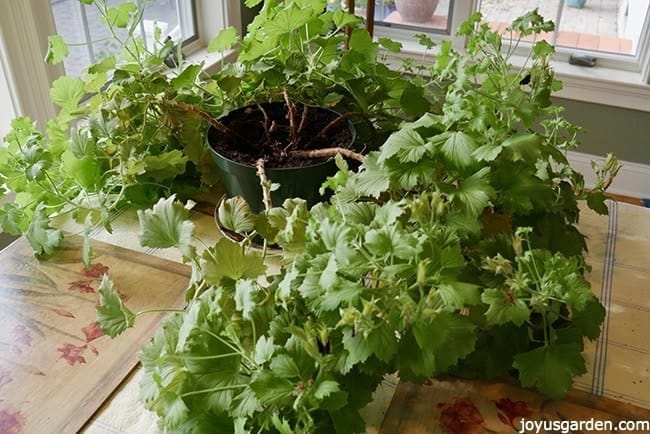
Here’s geranium # 2. It was much faster to prune because it only had 6 or 7 stems & all the foliage was at the ends.
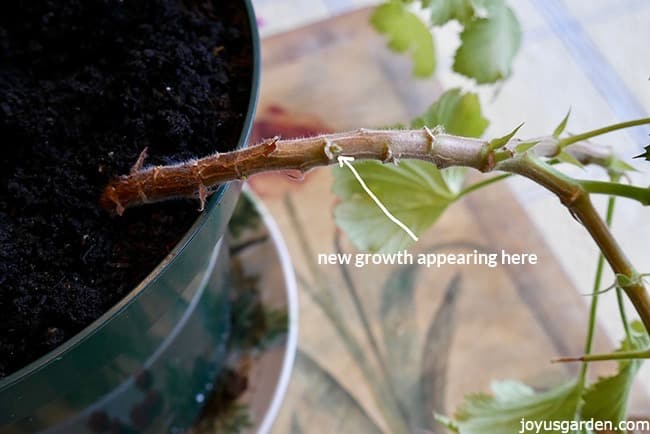
The bottom line is that geraniums (pelargoniums) are vigorous growers and very forgiving when it comes to pruning. They use a lot of energy to grow and flower like crazy. They need this pruning so they can rest up for next year.
Here’s a close up so you can see the new growth appearing out of the nodes.
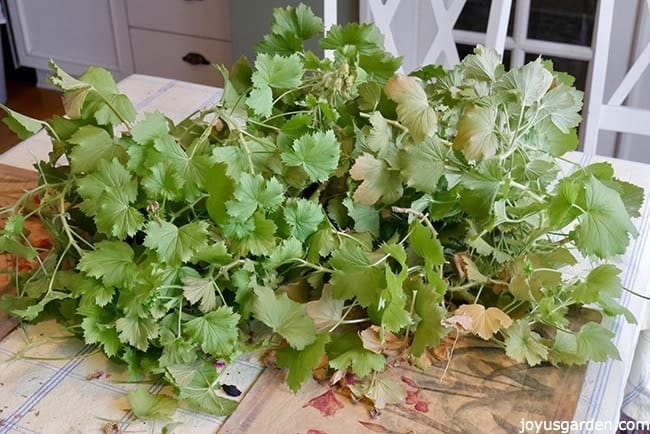
I topped both of the pots off with fresh soil (be careful not to completely cover the stems) and gave them both a good drink of water. No need to fertilize at this time of year (late summer) because the plant will be going to rest. Depending on where you live, you can feed your geraniums come spring and then again in summer.
Here’s all I took off of geranium #2.
Pruning leggy, overgrown geraniums (pelargoniums) isn’t hard but it can be a bit puzzling when you 1st look at them. You basically want to thin them out and open them up so the new growth has plenty of room to grow in. I find that after a few minutes I’m in the “pruning zone” and it actually goes pretty fast.
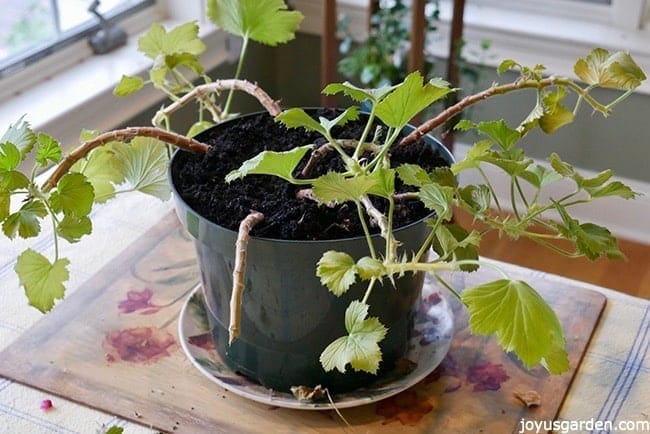
The end result of pruning geranium #2.
I saved quite a few cuttings for my cousin (I just put the shortened stems in water – geraniums root easily this way) so she can have more or give them away. Oh boy, more pruning of geraniums to do!
Happy gardening,

You May Also Enjoy:
Pruning And Propagating A Baby Rubber Plant
Succulent Plants Growing Long Stems: Why It Happens And What To Do
How To Prune Off And Plant An Air Layer Rubber Tree Plant
How I Prune, Propagate, And Train My Stunning Hoya

This post may contain affiliate links, you can read our policies here.


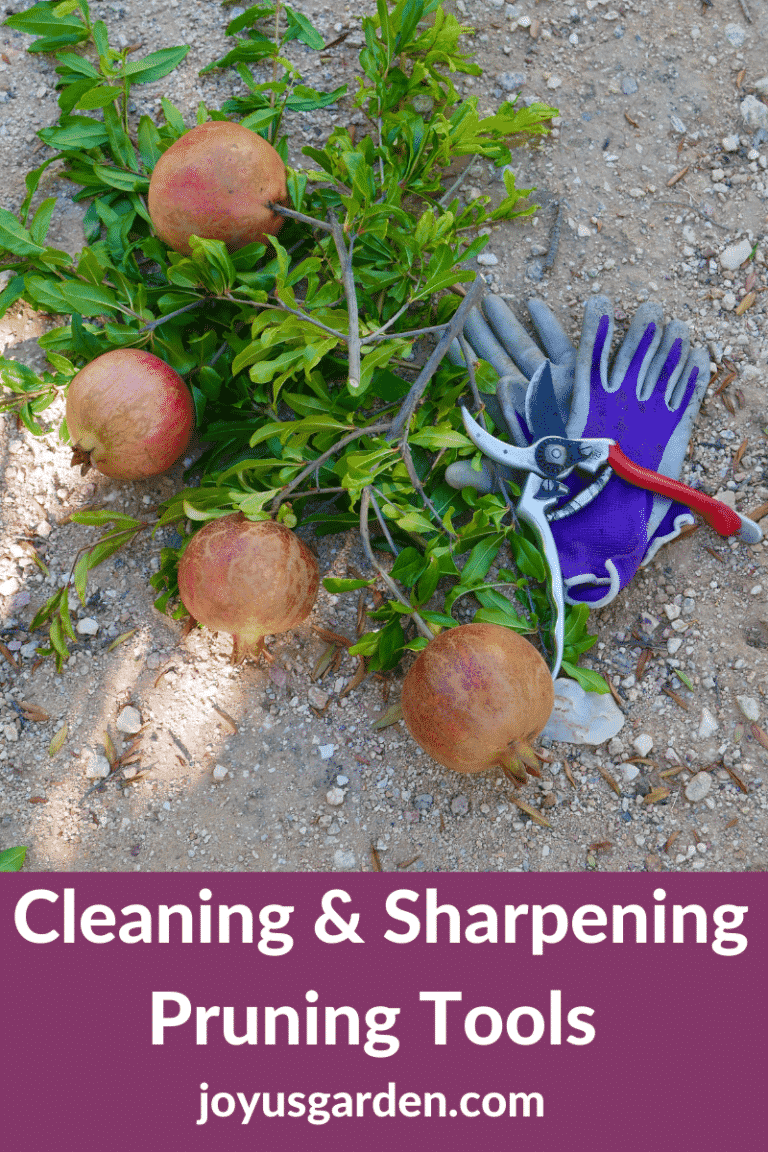

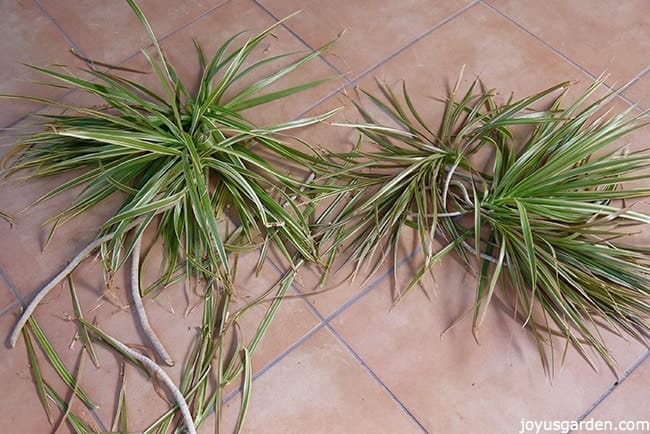
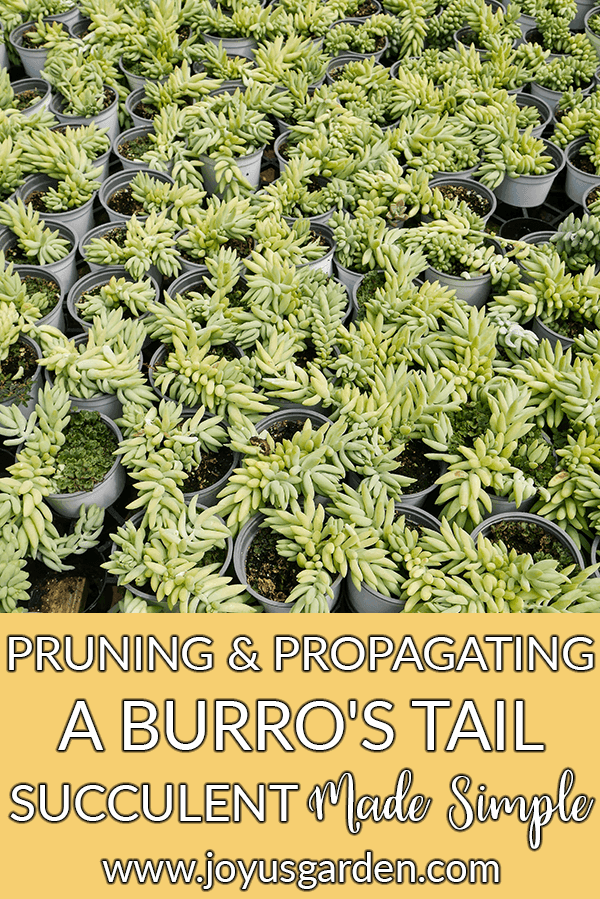
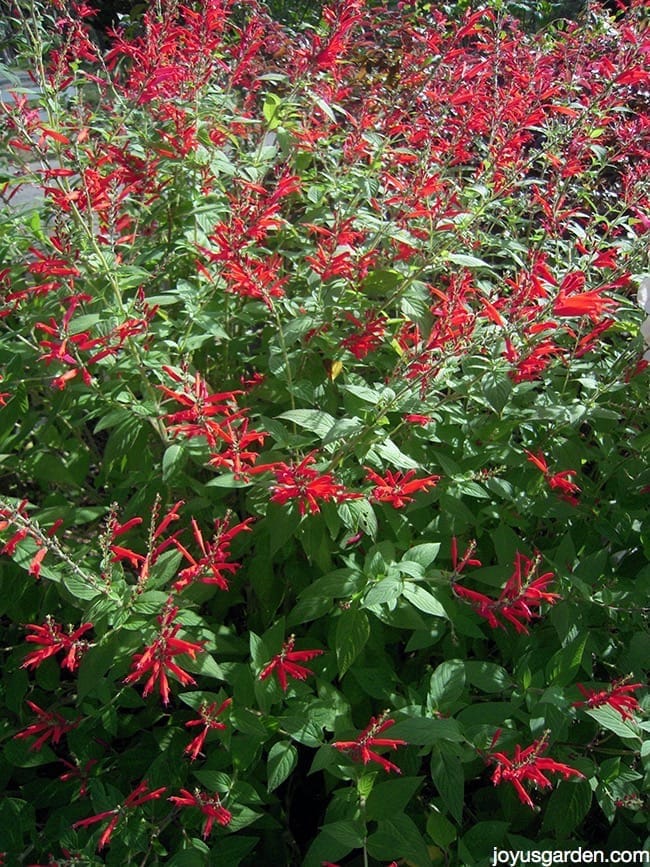

Geranium or pelargonium it is a species very resistant to cold and drought, easy to grow. Great tips that will help me overgrown my geranium.
Great Dana. Nell
I have a large geranium in a pot, it has a lot of dead leaves at the base of the stem. The growth on the end of the stems is very healthy. How do I remove the dead leaves.
Hi Janice – You can pinch them off with your finger nails, use scissors or floral nips. If they’re dry enough, they’ll come right off with a gentle pull. Nell
Hi Nell, – I have some young pelargoniums a couple of which look very healthy. However, the others are extremely leggy with brown wilting leaves yet healthy growth at tips. Is it ok to prune now (in June) and in the process take cuttings or are they too young? Many thanks
Hi Kirsten – Pelargoniums at any age are pretty tough. As long as the stems are more than 3-4″ & you can get at least 1 node in water, they’ll be fine. Pruning now is fine; you don’t want to do it in late fall or winter. Nell
Hi Nell!
In a Google world full of tips on how to propagate a geranium from cuttings, I was thrilled to find this article!
I have geranium that is super over grown and takk and the stem itself has turned into a “branch”. If I cut it, to get rid of the area that has no leaves growing from it, do I just put the rest of it in soil to reroot or do I put it in water first? (It wouldn’t be a “clipping”, it would be a few feet).
Thanks!!
Hi Jill – Geraniums & pelargoniums are very forgiving when it comes to propagating. I’d cut it down to 1′ & root it in water. You don’t want leggy cuttings! Nell
I hope this doesn’t post twice– my initial message didn’t seem to save..
Was super glad to find your article, everything I’ve tried searching for yields a how-to on regrowing cuttings/clippings. I have a huge overgrown geranium; to the point where the main stalk looks like a branch.
There’s a section of it with no growth that I would like to cut and get rid of but then I would like to replant the top portion of it.
My question is: do I just stick it in the soil, or should I root it in water first?
Thanks!
Just answered this Jill. I usually root in water 1st. It’s easy to do. Nell
My daughter grew a pelargonium from seed earlier this year, and the thing is tall and beautiful. We didn’t know to prune it to shape it until it was too late, so there’s really one main branch for about 12″ before it branches off into another large branch. It’s now so top-heavy that it’s falling over! Can we prune it way, way down after it stops blooming to promote a bushier plant, or are we out of luck? Also, you mention not to cover the stem, but I was wondering if adding more soil might help it stand up. Is that a bad idea?
Thanks,
Gina
Hi Gina – You can prune geraniums way back; at least by half. You can add an inch or so of soil but the pruning should do the trick. Nell
Hi Nell,
Truly appreciated your video on geranium pruning. Thank you for being so thorough. I don’t have a Facebook page to ‘ like’ you, but wanted to show my appreciation. Keep up the good work. Us amateurs need all the help we can get. Thank you!
Thank you Lynn! Gardening is all about experiences & I’m happy to share mine. Nell
Hi Nell… I’m so glad that I came across your website. I am a definitely a super noob when it comes to any type of gardening. But it is something that I have always wanted to learn about and do . I was gifted a citronella plant late last Summer and having zero idea what a citronella looked like so all I did was water it. Now it is very long and leggy and pretty much looks like a hanging plant.. it’s out of control.. It is now almost the middle of November, and I have got to cut this back. Is it going to be okay if I do this? It looked really green a few weeks ago and now most of the stems and leaves are starting to turn brown and I’m just worried that if I cut it all back that it might die? Any help or advice you could give me would be greatly appreciated. Thank you so much.
Hi Lori – Glad you found the site too! It’s early December now & if you have to, do a lighter pruning. You can give it a heavier one in spring. Nell